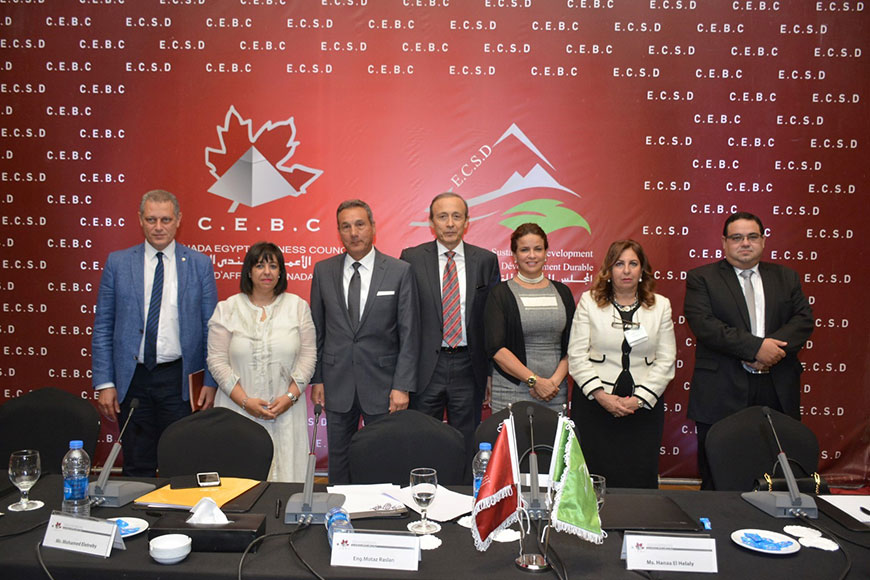
Date
Speaker(s)
Dr. Nevine Gamea
Ms. Nermeen El-Tahri
Ms. Reem Al-Saadi
Dr. Mohsen Adel
Ms. Hanaa El Helaly
Presentation
Description
The Egyptian government is making great efforts to support small and medium enterprises to combat poverty, unemployment and expand its participation in economic development through many initiatives and plans; aimed at developing and pushing the economy. However, there are still many challenges such as financing, marketing and training, which stand as an obstacle in launching SMEs. In this context, Canada Egypt Business Council and the Egyptian Council for Sustainable development organized an event with Mr. Mohamed Al-Etrebi, President of Bank Misr, Ms. Narmine El Tahiri, General Director at the Central Bank of Egypt, Ms. Reem El Saadi, Program Manager of the European Bank for Reconstruction and Development, Dr. Mohsen Adel, Vice President of the Egyptian Association for Investment and Finance, and Ms. Hanaa El Hilaly, UN Development Specialist to discuss the challenges and opportunities of SMEs.
In the opening remarks Eng. Moataz Raslan welcomed the guests, and then he mentioned that small and medium-sized enterprises are the engine of sustainable economic growth and the main axis for job creation and fighting unemployment. He added that 2.5 million small enterprises provide 75% of the current labor force. Also, that the industrial revolution in Europe started from small projects, pointing out that all countries are aware of the importance of SMEs and strive for their development. He pointed out that Egypt is late in developing small and medium enterprises despite the importance of the sector in pushing growth rates and creating jobs, but there are quick steps supported by President Abdel Fattah al-Sisi to encourage SMEs, establish a small-scale enterprise and offer initiatives from the central bank to support this sector.
Mr. Mohammed al-Etrebi, head of Bank Misr, said that despite the high inflation rates, the dollar’s turnover reached $ 710 million in one day for the first time, pointing out that Bank Misr’s share was $ 90 million according to the Central Bank of Egypt’s statistics. He added that the economic reform measures taken by the state have led to a decrease in imports and an increase in exports, stressing that the contribution of Bank Misr has added to small and medium-sized enterprises, in many villages and cities of the republic.
He pointed out that Bank Misr contributes to national projects such as El Asas city in Dumyat and Al-Rubiki for leather, calling on young people to work in the private sector and not to wait for the governmental employment. Considering the risk of loans non-payment, Al-Etribi stressed that the risk ratio did not exceed 1%, emphasizing that the banks are checking the guarantees and documents until the depositors’ money is confirmed and the bank is able to re-lend for the second time.
Ms. Reem Al-Saadi, said that the difficulties faced by small and medium enterprises in Egypt are the absence of a clear business plan for the company, which prevents them from obtaining the funds needed to start the project.
She added that the European Bank provided advisory services to about 600 SMEs to facilitate their access of receiving finance from banks and provided about $ 500 million to Egyptian banks to finance small-scale projects.
Ms. Narmeen Al Tahiri, Director General of Banking Reform at the Central Bank, said that the Bank is coordinating with the donors to launch new financing mechanisms in cooperation with the most important experts in major banks such as Bank Misr, the National Bank of Egypt and the Commercial international bank to serve the objectives of developing SMEs. In addition, the bank is evaluating companies to add them to the individual rating system. She pointed to creating workshops in the presence of the most important bank experts before launching any program, stressing on the importance of the full coordination with the Ministry of Industry and the Central Bank in this framework.
Dr. Mohsen Adel, vice president of the Egyptian Association for Finance and Investment, said that the law of 141/2004 regulating the flow of small and medium enterprises sector is waiting for the “bullet of mercy” as the current form does not serve and does not guarantee any serious incentives for small projects. Also, he called for the need to add effective amendments and follow the mechanisms prepared by the new investment law, by discussing them with all concerned parties in the sector to well reform the law, in order to contribute to the launching of this important sector.
He added that the sector needs full planning of incentives, financing and provision of technology services for the establishment of companies, and this role is given to the Small and Medium Enterprise Development Agency, which was recently established by the Ministry of Industry. He pointed out that the system faces three major challenges, which are the size of the system which includes four administrative bodies, the responsibility of micro, small and medium projects, where each of which has different funding and procedures, which complicates the process, and acting as a regulator and executor at the same time.
The floor was opened for questions and answers session discussing the need to use the Nile Stock Exchange in small and medium enterprises to finance SMEs and conducting a huge survey among small entrepreneurs to know the challenges and problems that face them.













